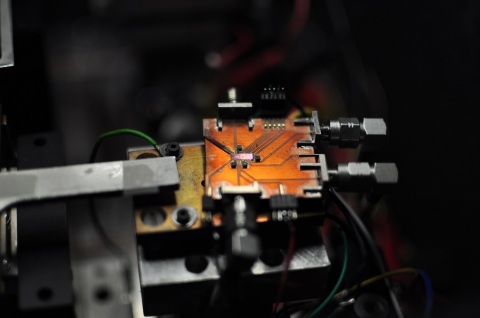Researchers demonstrate fast and cost-effective platform for keeping data secure
WASHINGTON — (BUSINESS WIRE) — March 19, 2020 — Researchers have demonstrated new chip-based devices that contain all the optical components necessary for quantum key distribution while increasing real-world security. The fast and cost-effective platform is poised to facilitate implementation of extremely secure data communication that can be used to protect everything from emails to online banking information.
This press release features multimedia. View the full release here: https://www.businesswire.com/news/home/20200319005632/en/

This chip-based device (pink) measures just 6 x 2 millimeters and is poised to provide a fast and cost-effective platform for extremely secure data communication. Credit: Henry Semenenko, University of Bristol
Advances in computing technology will soon leave today’s methods for encrypting online data vulnerable to eavesdropping. Quantum key distribution offers impenetrable encryption by using the quantum properties of light to generate secure random keys between users for encrypting and decrypting their online data. Although quantum key distribution is compatible with most fiber-optic networks, more robust and less expensive devices are needed to carry out this encryption method outside the lab.
In Optica, The Optical Society's ( OSA) journal for high-impact research, the researchers report that secure quantum key exchange can be accomplished between two chip-based devices — measuring just 6 x 2 millimeters — potentially over a fiber network with links up to 200 kilometers long.
“Chip-based devices significantly reduce the barrier for widespread uptake of quantum-secured communication by providing a robust, mass-manufacturable platform,” said research team leader Henry Semenenko from the University of Bristol, UK. “In the future, these devices will form part of a standard household connection to the internet that keeps our data secure regardless of advances in computing technology.”
Reducing size and power needs
The new quantum key distribution devices are based on the same semiconductor technology found in every smartphone and computer. Instead of wires to guide electricity, they contain highly complex circuits that control the weak photonic signals of light necessary for quantum key distribution. Nanoscale components in the chips make it possible to drastically reduce the size and power consumption of quantum communication systems while maintaining high-speed performance vital for modern networks.
“With its densely packed optical components, our chip-based platform offers a level of precise control and complexity not achievable with alternatives,” said Semenenko. “It will allow users to access a secure network with a cost-effective device the same size as the routers we use today to access the internet.”
The researchers designed the new platform to facilitate citywide networks and drastically reduce the number of connections required between users.
“Our platform allows single users to connect to a centralized node that enables secure communication with every other user,” said Semenenko. “As quantum networks develop, the centralized node will offer crucial infrastructure that will eventually support more complex communication protocols.”
Demonstrating the devices
The researchers demonstrated their new chip-based devices with a proof of principle experiment in which they emulated a 200-kilometer fiber network at the University of Bristol Quantum Engineering Technology Labs. Using two independent chip devices, they showed that error rates and speed were comparable to state-of-the-art, commercial components.
“We showed that these chip-based devices can be used to produce quantum effects even when photons were generated by different devices,” said Semenenko. “This is vital for quantum networks where each user will control their own devices that are distributed around a city.”
The researchers plan to make the system more practical by developing application-specific hardware. They will then use the fiber-optic network in place around the city of Bristol to create a demonstration metropolitan network with many users.
Paper: H. Semenenko, P. Sibson, A. Hart, M. G. Thompson, J. G. Rarity, C. Erven, “Chip-Based Measurement-Device-Independent Quantum Key Distribution,” Optica, 7, 3, 238-242 (2020).
DOI:
https://doi.org/10.1364/OPTICA.379679
About Optica
Optica is an open-access, journal dedicated to the rapid dissemination of high-impact peer-reviewed research across the entire spectrum of optics and photonics. Published monthly by The Optical Society (OSA), Optica provides a forum for pioneering research to be swiftly accessed by the international community, whether that research is theoretical or experimental, fundamental or applied. Optica maintains a distinguished editorial board of more than 60 associate editors from around the world and is overseen by Editor-in-Chief Prem Kumar, Northwestern University, USA. For more information, visit Optica.
About The Optical Society
Founded in 1916, The Optical Society (OSA) is the leading professional organization for scientists, engineers, students and business leaders who fuel discoveries, shape real-life applications and accelerate achievements in the science of light. Through world-renowned publications, meetings and membership initiatives, OSA provides quality research, inspired interactions and dedicated resources for its extensive global network of optics and photonics experts. For more information, visit osa.org.
View source version on businesswire.com: https://www.businesswire.com/news/home/20200319005632/en/
Contact:
Media:
Aaron Cohen
(301) 633-6773
aaroncohenpr@gmail.com
mediarelations@osa.org








